This is the third in a series of postings on the use of Dirichlet processes for non-parametric Bayesian analysis and their implementation in Stata. In this posting I will create a Stata program that fits a Bayesian model that incorporates a Dirichlet process prior. As my example I will model the peak expiratory flow measurements […]
Bayesian Analysis with Stata
Selecting a Dirichlet Process Prior
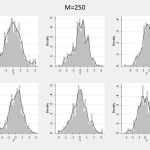
This is a continuation my previous posting on non-parametric Bayesian analysis and this time I will try to show how a Dirichlet process can be used to create a family of distributions that provide much more flexible priors than the standard options such as the normal or gamma. Last time we saw how we can represent a distribution […]
Non-parametric Bayesian Analysis
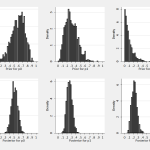
On the internet there is a host of sites that describe the mathematics of Dirichlet processes, but very few of them try to explain the ideas behind the algebra. Dirichlet process methods are very important for modern Bayesian analysis and raise a number of interesting programming issues when they are to be implemented in Stata, […]
Solutions to the Exercises: Chapter 2
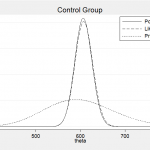
This is the second of my occasional postings working through the exercises given at the end of the chapters in ‘Bayesian analysis with Stata’. Chapter 2 was perhaps the most difficult chapter to write because I wanted to cover the creation of Stata programs for the calculation of the log posterior before I had introduced […]
Monitoring Convergence in High Dimensions continued
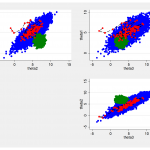
In my last posting I introduced a program for comparing different methods of convergence assessment in multi-dimensional MCMC analyses. Essentially the program samples from an imaginary posterior that takes the form of a user specified mixture of multivariate normal distributions. Previously, I illustrated some of the problems of assessing convergence by looking at a simulated […]
Monitoring Convergence in High Dimensions
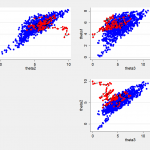
In Chapter 5 of ‘Bayesian Analysis with Stata’ I discussed methods for monitoring the convergence of a set of MCMC simulations. Obviously it is important to demonstrate the effectiveness of different approaches to the assessment of convergence using output from real MCMC analyses, but often real problems are difficult to judge because we do not know the exact truth […]
Model-free Genetic Meta-analysis
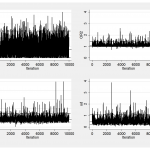
Some years ago some colleagues and I wrote a paper about the Bayesian meta-analysis of genetic association studies (Minelli et al Statistics in Medicine 2005;24:3845-3861) and periodically since then people have contacted me asking for the WinBUGS code that we used in that paper and those requests have prompted me to reformulate the code in terms of […]
Solutions to the Exercises: Chapter 1
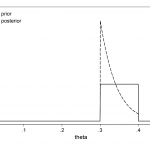
I usually set my students open-ended questions but I like to break down the tasks in order to help them structure their answers. Anyway, whatever the merits of this type of questioning, that approach has certainly influenced the exercises that I have given at the end of each chapter of ‘Bayesian analysis with Stata’ and because many of those exercises are open-ended, I […]


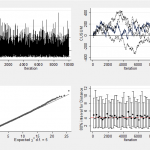
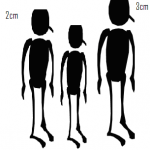
Recent Comments